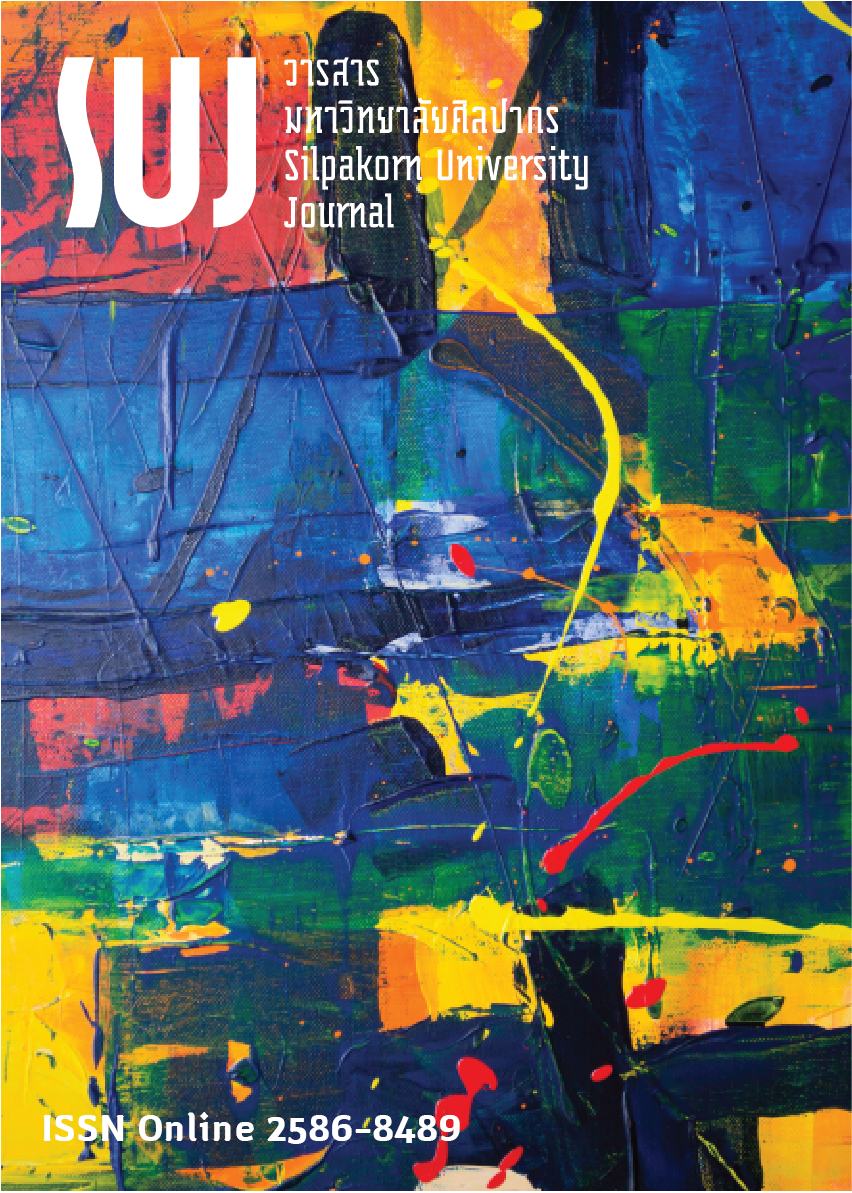การจัดการความรู้ เพื่อก้าวสู่องค์กรดิจิทัลในยุคเทคโนโลยีพลิกผัน (Knowledge management for the digital organization in disruptive technology era)
Main Article Content
Abstract
ปัจจุบันรูปแบบการเรียนรู้ และการทำงานสามารถเกิดขึ้นได้ในทุกที่ ทุกเวลา โดยเฉพาะอย่างยิ่งในยุคที่ความรู้และเทคโนโลยีเกิดการเปลี่ยนแปลงอย่างรวดเร็ว ไม่เพียงแต่ประชาชนเท่านั้นที่จะต้องแข่งขันท่ามกลางสังคมที่เป็นอยู่ในขณะนี้ แต่ยังครอบคลุมและรวมถึงองค์กร หน่วยงานต่าง ๆ ที่ต้องมีการแข่งขันทางด้านเศรษฐกิจเพิ่มมากขึ้น โดยนำเทคโนโลยีดิจิทัลที่ทันสมัยมาประยุกต์ใช้เพื่อให้การปฏิบัติงานมีความสะดวกรวดเร็ว และลดความผิดพลาดที่จะเกิดขึ้น แต่ทั้งนี้ปัจจัยที่สำคัญอีกประการหนึ่งที่จะช่วยให้การขับเคลื่อนองค์กรเกิดความก้าวหน้าได้ นั่นก็คือ “ความรู้ของบุคลากรในองค์กร” ซึ่งสามารถใช้เป็นเครื่องมือในการเพิ่มประสิทธิภาพการปฏิบัติงาน และนำไปสู่องค์กรที่เรียกว่า “องค์กรดิจิทัล” ดังนั้นในบทความวิชาการนี้จะนำเสนอประเด็นเทคโนโลยีพลิกผัน การประยุกต์เทคโนโลยีพลิกผันกับการจัดการความรู้ การใช้เทคโนโลยีสารสนเทศและการสื่อสารในกระบวนการจัดการความรู้ ศูนย์กลางความรู้ดิจิทัล รวมถึงความท้าทายการจัดการความรู้ขององค์กรดิจิทัลในยุคเทคโนโลยีพลิกผัน เพื่อให้นักศึกษา ผู้บริหารองค์กร หรือผู้ที่สนใจตระหนักถึงประโยชน์ของการจัดการความรู้ การประยุกต์ใช้เทคโนโลยีภายในองค์กร รวมถึงการจัดการทรัพย์สินทางปัญญาขององค์กร ตลอดจนสามารถนำแนวคิดทางการจัดการความรู้ไปประยุกต์ใช้เป็นส่วนหนึ่งในการพัฒนาองค์กรของตนเองสู่องค์กรดิจิทัลเพื่อสร้างความอยู่รอด เสริมสร้างสมรรถนะทางการแข่งขันด้วยการจัดการความรู้ที่ดี มีประสิทธิภาพ และเพื่อให้ก้าวทันต่อการเปลี่ยนแปลงของภาคธุรกิจ สังคมโลกอย่างมั่นคงและยั่งยืน
Recently, synchronous learning and working could happen anywhere and anytime especially in an era in which knowledge and technology are shifting drastically and dynamically. If organizations are incapable of keeping up with any new knowledge or not meeting a resilient adaptability, this might result in negative effects. Since we are in a competitive society, organizations must strengthen themselves to survive in the business world by applying modern technology to ease and reduce the working process. Another important factor which drives organizations is ‘knowledge of people in organizations’ as it is an effective tool to operate every task and it could finally become a ‘digital organization’. This article represents concepts of disruptive technology, applications of disruptive technology and knowledge management, usage of information technology and communication in a knowledge management process, knowledge center of digital organizations, and challenges of digital organizations in the disruptive technology age. Thus, stakeholders who have already paid attention to such issues will be aware of the benefits of knowledge management. They will become a part of their own organization development in becoming digital organizations in which applying these concepts to support organizations, build up competitive capacities effectively, and catch up with dynamic changes in business and world context firmly and sustainably.
Downloads
Article Details

This work is licensed under a Creative Commons Attribution-NonCommercial-NoDerivatives 4.0 International License.
References
Bartlett, J. (2005). Why Organizations Need to Invest in An Enterprise Knowledge Management Solution. [Online]. Retrieved January 8, 2020 from https://www.sagitec.com/blog/why-organizations-need-to-invest-in-an-enterprise-knowledge-solution
Chookait, Saran. (1998). Knowledge Management Tools (เครื่องมือที่ใช้ในการจัดการความรู้). [Online]. Retrieved January 6, 2020 from http://ea-rmuti.net/eakm/?page_id=303
Davenport, T., & Prusak, L. (1998). Working Knowledge: How Organization Manage What They Know. Boston: Harvard Business School Press.
Eamwat, Sribavorn. (2018). Trend of the Disruptive Technology and the Possible Future Business Model of Copier Innovation in Thailand (แนวโน้มของ Disruptive Technology และความเป็นไปได้ของรูปแบบธุรกิจในอนาคตของเครื่องถ่ายเอกสารในประเทศไทย). Master’s dissertation, Thammasat University, Bangkok, Thailand.
Gavin, D. A. (1993). Building a Learning Organization. Harvard Business Review. [Online]. Retrieved January 8, 2020 from https://hbr.org/1993/07/building-a-learning-organization
Ikujiro, N., & Hirotaka, T. (2005). The Knowledge-creating Company. [Online]. Retrieved January 8, 2020 from https://books.google.ee/books?id=B-qxrPaU1-MC&printsec=frontcover&hl=et#v=onepage&q&f=false
Jindapradit, Thanawich. (2018). Guidelines for The Development of Work Systems and Processes to Become A Digital Organization (แนวทางการพัฒนาระบบงานและกระบวนการทำงานสู่การเป็นองค์กรดิจิทัล). [Online]. Retrieved January 6, 2020 from http://wise.co.th/wise/Presentations/Digital/Organization_4_0_17_January_2018.pdf
Kaitsarapipob, Anan. (2019). Disruptive Technology (เทคโนโลยีพลิกผัน). [Online]. Retrieved January 5, 2020 from https://library2.parliament.go.th/ejournal/content_af/2562/feb2562-4.pdf
Kunpolkaew, Jamluk. (2019). Keys to Developing a Digital Organization (หัวใจสำคัญเพื่อพัฒนาองค์กรไปสู่องค์กรดิจิทัล). [Online]. Retrieved January 6, 2020 from https://www.up-2be.com/4%E0%B8%AB%E0%B8%B1%E0%B8%A7%E0%B9%83%E0%B8%88%E0%B8%AA%E0%B8%B3%E0%B8%84%E0%B8%B1%E0%B8%8D-%E0%B9%80%E0%B8%9E%E0%B8%B7%E0%B9%88%E0%B8%AD%E0%B8%9E%E0%B8%B1%E0%B8%92%E0%B8%99%E0%B8%B2/
Lamont, J. (2012). Big Data has Big Implications for Knowledge Management. [Online]. Retrieved January 7, 2020 from http://www.kmworld.com/Articles/Editorial/Features/Big-data-has-big-implications-for-knowledge-management-81440.aspx
Laudon, K. C., & Laudon, J. P. (2014). Management Information Systems: Managing the Digital Firm (13rd ed.). [Online]. Retrieved January 7, 2020 from http://dinus.ac.id/repository/docs/ajar/Kenneth_C.Laudon,Jane_P_.Laudon_Management_Information_Sysrem_13th_Edition_.pdf
Lersmethasakul, Thanakrit. (2019). Knowledge Management and Digital Knowledge Center (ศูนย์กลางการจัดการความรู้ดิจิทัล). [Online]. Retrieved January 5, 2020 from https://www.thanakrit.net/km-digital-knowledge-center-1/
LoPresti, M. (2014). The Long Tail of Knowledge: Big Data’s Impact on Knowledge Management. [Online]. Retrieved January 7, 2020 from http://www.econtentmag.com/Articles/News/News-Feature/The-Long-Tail-of-Knowledge-Big-Datas-Impact-on-Knowledge-Management-96285.htm
Marquardt, M., & Reynolds, A. (1994). The Global Learning Organization. Burr Ridge: Irwin.
McAfee, A., & Brynjolfsson, E. (2012). Big Data: The Management Revolution. Harvard Business Review. [Online]. Retrieved January 7, 2020 from https://hbr.org/2012/10/big-data-the-management-revolution/ar
National Science and Technology Development Agency. (2017). Knowledge Trend in Digital Age (แนวโน้มของการจัดการความรู้ในยุคดิจิทัล). [Online]. Retrieved January 5, 2020 from https://www.nstda.or.th/th/nstda-knowledge/knowledge-management/12105-trend-km-digital-age
Office of Knowledge Management and Development. (2020). Lifelong Learning in Digital Age (การเรียนรู้ตลอดชีวิตในยุคดิจิทัล). [Online]. Retrieved January 8, 2020 from http://www.okmd.or.th/upload/pdf/magazine/The_Knowledge_vol_12.pdf?fbclid=IwAR01F1SzyFcorZdy1u0FIP4kyXwXxGhFMyCZnb4X44_Afzc8BlynD7P5NSI
Office of the Public Sector Development Commission. (2020). Digital Development for National Economic and Social Development (แผนพัฒนาดิจิทัลเพื่อเศรษฐกิจและสังคม). Bangkok: Office of The Public Sector Development Commission.
Paiboonbaramee, Wanchai. (2019). Disruptive Technology in Digital Transformation (จุดเปลี่ยนธุรกิจในยุคการปรับเปลี่ยนองค์กร). [Online]. Retrieved January 5, 2020 from http://www.362degree.com/2018/05/02/disruptive-technology-%E0%B8%88%E0%B8%B8%E0%B8%94%E0%B9%80%E0%B8%9B%E0%B8%A5%E0%B8%B5%E0%B9%88%E0%B8%A2%E0%B8%99%E0%B8%98%E0%B8%B8%E0%B8%A3%E0%B8%81%E0%B8%B4%E0%B8%88-%E0%B9%83%E0%B8%99%E0%B8%A2/
Rijmenam, M. V. (2013). Walmart Makes Big Data Part of Its DNA. [Online]. Retrieved January 7, 2020 from http://smartdatacollective.com/bigdatastartups/111681/walmart-makes-big-data-part-itssocial-media
Sakpuwadol, Surinthip. (2010). Digital Organization Administration (การบริหารองค์กรดิจิตอล). [Online]. Retrieved January 7, 2020 from http://www.ict.up.ac.th/surinthips/MIS2553/%E0%B9%81%E0%B8%9A%E0%B8%9A%E0%B9%80%E0%B8%A3%E0%B8%B5%E0%B8%A2%E0%B8%99/Ch5_DigitalFirm_53.ppt
Senge, P. M. (1990). The Fifth Discipline: The Art and Practice of The Learning Organization. [Online]. Retrieved January 8, 2020 from http://kmcenter.rid.go.th/kmc08/km_59/manual_59/Book6/The-Fifth-Discipline.pdf
Suksamran, Napadol. (2011). Why to use KM (เหตุผลการนำ KM มาใช้). [Online]. Retrieved January 5, 2020 from http://ea-rmuti.net/eakm/?page_id=284
Thanabodeethammajarue, Danairat. (2018). Digital Organization Designing (การออกแบบองค์กรดิจิทัล). [Online]. Retrieved January 5, 2020 from https://www.ocsc.go.th/sites/default/files/attachment/page/sruphng_1_kaarkaebbngkhkrdicchithal.pdf
Vateekul, Peerapon. (2015). The Success of Big Data (ความสำเร็จของอภิมหาข้อมูล). [Online]. Retrieved January 7, 2020 from http://www.dailynews.co.th/Content/IT/300610/Big+Data


